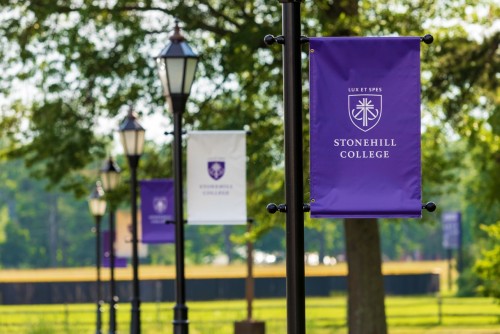Teaching Program Lets Students Share Their Passions
The IDEAS program offers all students a chance to gain leadership skills while sharing their passions through courses they design and teach.
Shakespeare’s Juliet famously agonized over the question, “What’s in a name?” Students involved in a Stonehill program that allows them to design and teach a course to classmates sometimes agonize over the same question and for a similar reason: passion.
The Integrating Democratic Education at Stonehill (IDEAS) program allows students to take an issue about which they are passionate and design a course around it. Professor Wanjiru Mbure, program director, recalls that a student in the 2022 cohort was plagued with worry while trying to produce a course image and title before the submission deadline.
“Something like a course title, which may seem so tangential to some, is, in their eyes, a reflection of what they want to teach,” the faculty member said. “The students really think deeply about what they want to communicate through their courses.”
This year, 11 courses are being offered through the program and all are capped at 10 students, allowing for close collaborations among peers. Mbure notes that class facilitators not only increase their leadership and communication skills through their teaching, but also learn how to use their passions to benefit others.
Student-instructors receive a great deal of support when developing their courses, facilitated during the spring semester. They not only take two courses with Mbure and two student co-directors to hone their teaching skills, but also meet with faculty mentors and IDEAS alumni to flesh out their course concept, develop syllabi and discuss matters such as fostering an inclusive classroom.
“Success and support are so intertwined in IDEAS,” Mbure said. “I keep saying it takes a village, then we build a village around that village.”
Here, the student facilitators reflect on their courses:
Success and support are so intertwined in IDEAS. I keep saying it takes a village, then we build a village around that village.
Building an Offensive Line Against Discrimination
Class of 2022 criminology majors Maxamillion O’Quinn, Sam Tannous and Garrett McCarthy had some trepidations when preparing to teach their IDEAS course, Ending Racism Through Sports. The class investigates how athletics can help break racial barriers by examining difficult topics such as the Syracuse 8 and the impact of busing on high school sports.
“I was worried there were going to be crickets when we opened things up for discussion, but during one of our first classes, we actually had to cut people off because we ran out of time,” said McCarthy, who hails from Hyde Park, Boston.
The three instructors, all Stonehill football players, attribute this bountiful discourse to the fact that sports can be a great equalizer.
“It’s much easier to talk about a difficult topic like racism when you’re focusing on it through something that brings people together,” said Tannous, native to Dedham, Massachusetts.
No matter the subject, the trio keep inclusivity, a tenet of democratic education, top of mind during class.
“We want to discuss topics wholeheartedly so people can have those breakthrough moments that allow them to learn things they may not have known growing up due to lack of experience or their environment,” said O’Quinn, who was raised in Queens, New York.
Right: Garrett McCarthy ’22, criminology major
Maxamillion O’Quinn ’22, criminology major
Sitcoms & Society
Like Elizabeth Olsen’s Scarlet Witch in the 2021 miniseries WandaVision, communication major Emma Cahill ’24 spent the spring 2022 semester on a trek across the TV sitcom landscape. The East Hampton, Connecticut, resident set out on this quest through her IDEAS course, In Defense of the Laugh Track.
Each week, Cahill and her students come together to examine a different sitcom, among them Bewitched, All in The Family and Sex and The City. As they proceed chronologically through sitcom history, they investigate how societal norms shaped these series and vice versa.
“One of the main points I want to drive home is the difference between being funny and making fun of someone,” Cahill said. “Unfortunately, many of the shows we are studying are considered funny because they are poking fun at some group.”
As part of their midterm assignment, students are tasked with rewriting an episode of a show they studied in class to fit more inclusive, 21st century norms. For their final, they will craft a sitcom pilot pitch.
Emma Cahill ’24, communication major
Taking Action to Understand Addiction
Class of 2022 healthcare administration majors Megan Anderson and Caitlin Regan began their IDEAS course, Drugs Impact All, by asking students why they decided to take the class. Neither was surprised when most said they signed up because their families had been impacted by addiction in some fashion.
“Through this class, we want to educate students that drug addiction does not discriminate, that it can happen to anyone,” said Anderson, who comes from Wilbraham, Massachusetts. “We also want to show people that addiction does not equal weakness.”
As they discussed stigmas tied to substance abuse, the pair focus on topics such as the business of drugs, loving someone with an addiction and the opioid crisis. Anderson and Regan took cues from Mbure when creating a safe space in which students feel comfortable engaging with these topics.
“We reflect on a lot of things she does in class, and we adapt it to our own lessons. For example, she sits in a circle with us to promote discussion and we do the same in our class,” said Regan, originally from Atkinson, New Hampshire.
After graduating, Regan wants to work in healthcare management, while Anderson plans to earn a master’s in public health and population health. Both remarked that the experience of teaching this class will make them more compassionate healthcare workers.
Caitlin Regan ’22 and Megan Anderson ’22, healthcare administration majors
Thank You for the Music
Britney Savage ’23, a marketing major from Methuen, Massachusetts, has always had a song in her heart.
“My family raised me in church, so I sang in choirs as a child,” said the marketing major. “Then in high school, I decided to join the school chorus. I also did musical theater. I’ve carried my love of singing with me to college.”
Over the past few years, she has regularly performed the national anthem at Stonehill athletic events. Recently, however, she has been using her voice for something other than singing.
Savage partnered with Jasmine Santos ’22, a criminology major with a double minor in music and Arabic, to facilitate an IDEAS course called Rhythms of BIPOC America. The class examines Black, Indigenous and People of Color (BIPOC) musicians who have influenced genres such as classical, jazz, R&B, hip-hop, pop and Latinx music.
The two note they get as much out of the class as their students do. For Santos, who comes from Norwood, Massachusetts, the course ties into her career goals. After graduating, the instrumentalist, who plays violin, ukulele, trombone, guitar and piano, intends to take a gap year. She wants to teach music to children before going to law school.
“I think teaching music is going to be a fulfilling experience,” she said. “I’ll be able to take everything I’ve learned about being an instructor from IDEAS and apply it to a professional setting.”
Left to right: Jasmine Santos ’22, criminology major with a double minor in music and Arabic and Britney Savage ’23, marketing major
Related
-
Request Information
Sign up now to be added to our mailing list, and we will show you how Stonehill could become part of your story.
-
Visit Opportunities
Our visit programs will help give you a better understanding of how Stonehill’s expansive leadership and experiential learning opportunities equip students for success in a rapidly evolving and globally competitive world.
-
Apply for Admission
Stonehill College provides an exceptional learning experience for both undergraduate and graduate students. We invite you to review the process, requirements and application deadlines for our entry options.


